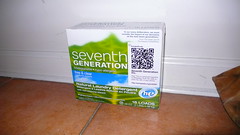Did You Know? – Part 2
Did you know that 2 out of 3 Americans Are Concerned With Toxins Found in Common Household Products?
Seventh Generation and Breast Cancer Fund Joined Together recently, to Discuss the Importance of Removing Toxins From Our Lives. This post, is a continuation of the recent study and it’s findings.
Education Needed and Transparency Demanded on Ingredients in Common Products
The study indicates that half of all Americans (50%) are unaware that many personal care, household cleaning, laundry and baby care products contain petroleum-based ingredients otherwise known as petro-chemicals. When provided with a list of chemicals in these products, 61% reported that they are “likely” or “very likely” to seek bio-based products the next time they shop.
In addition, 58% of respondents indicated that they “feel personally responsible to change their daily habits and purchase practices to positively impact the environment.” In fact, 58% of the respondents reported that they are “actively searching for greener (more energy-efficient, natural, and sustainable, etc.) products these days.”
“It’s time that the consumer products companies lift the veil that has shrouded most ingredients in mystery, allaying unwarranted concern for some, and providing a sound basis for stronger consumer action on others,” said Seventh Generation CEO John Replogle. “There’s no reason they can’t. Seventh Generation has been providing products that supply peace of mind for 25 years.”
Focus on ingredients in everyday household cleaners and personal care products, has increased significantly in recent years. In fact, just last month (September), Johnson and Johnson announced plans to remove carcinogens and other toxic chemicals from its personal care products by 2015.
Just recently, the American Cleaning Institute(R) launched a Cleaning Product Ingredient Inventory, that catalogs 900+ ingredients used in the U.S. cleaning products market (including soaps, detergents, and general cleaning products used in household, commercial, industrial and institutional settings).
The study has a margin of error of 3%.
On September 19th, Green-living guru Sara Snow, moderated a session on Livestream with Deepak Chopra, Seventh Generation and Breast Cancer Fund Individuals interested in learning more about this topic.
These experts discussed the findings of the new study, and explored the significance of the USDA Certified Bio-based label, as a credible way for consumers to make conscious choices about the products they bring into their homes.
About Seventh Generation
Seventh Generation, is committed to being the most trusted brand of household and personal care products for your living home. Our products are healthy solutions for the air, surfaces, fabrics, pets and people within your home — and for the community and environment outside of it. Seventh Generation, also offers baby products that are safe for your children and the planet. The company derives its name from the Great Law of the Iroquois Confederacy that states, “In our every deliberation, we must consider the impact of our decisions on the next seven generations.” Every time you use a Seventh Generation product, you are making a difference by saving natural resources, reducing pollution, and making the world a better place for this and the next seven generations.
For information on Seventh Generation cleaning, paper, baby and feminine personal care products, or to find store locations that carry their products, and explore the company’s website visit www.seventhgeneration.com.




















